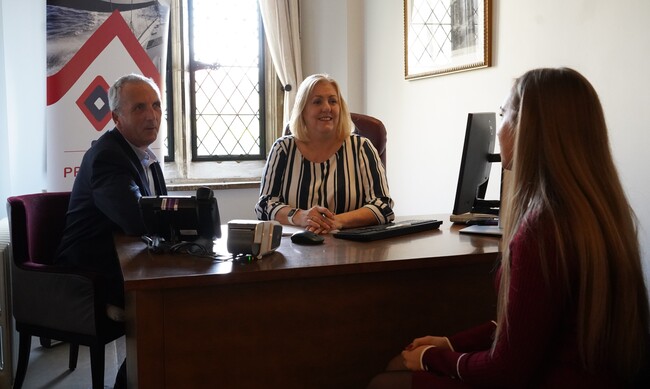If you’re going to sell online, you need a payment gateway.
It allows customers to make secure payments to your business online using their credit or debit card, or digital wallet.
Payment gateways are customisable to fit around your business and the way you prefer to take online payments.
You don’t need to have an eCommerce website to use a payment gateway, and they’re incredibly useful for businesses selling directly over social media or via email because they can be used with Pay by Link.
An efficient payment gateway can determine the profitability of your online store, so it’s important you get it right.
Payment gateways are a useful payment platform.
In this guide, we look at exactly what they are and how they help your business.
What is a payment gateway?
A payment gateway is an online alternative to a card machine.
It’s a service that authorises payments and lets customers enter their card details when buying something online.
The payment goes from the customer to your business, then from you to the customer’s bank to be approved, then into your account.
During this, all data is encrypted, so no one will ever have access to customers’ details.
As a business owner, it’s easier for you to process payments, and it’s completely secure for your customers.
How does a payment gateway work?
All details are encrypted during the buying process, including the name on the card and the expiry date.
Because the payment gateway is a separate online security portal, none of the payments happens through your website, so everything is fully secure.
Customers enter their card details to confirm the payment method.
If you’ve got returning customers, your payment gateway can save card details from past purchases to save them from entering their card details again.
These details are stored by the payment gateway, not your website, so you’re not responsible for the security and data management.
Your returning customers simply confirm the card they’re paying with and enter their CVV number to authorise the new payment.
The payment is sent to be processed before being authorised by the customer’s bank if they have the funds to clear the purchase.
You and the customer will get an automatic notification that the transaction was successful.
Why do you need to use a payment gateway?
Essentially if you want to accept online payments or use Pay by Link, then you’ll need a payment gateway.
Having an e-commerce section on your website that runs efficiently can boost your online sales.
If you have a physical shop you don’t have to rely on customers coming in to buy your products, you can sell outside of your opening hours and your local area.
This makes things easier for both businesses and customers.
If customers find it easy to shop on your site, they’re more likely to come back and repurchase as they trust you and the shopping experience.
Is a payment gateway secure?
Yes.
Payment gateways are a dedicated online portal for accepting payments and are built with security and encryption as standard so any details entered are kept safe.
All payments are processed and authorised through the portal, meaning you never see customers’ details.
With a gateway, you don’t need to go through individual payments, as everything is done for you.
This gives customers the peace of mind that their details won’t be shared, as everything is encrypted during the payment process.
It’s important you consider fraud protection when setting up a payment gateway, this can be done by having a filter that shows where payments are coming from.
What if I don’t have a payment gateway?
If you don’t have a payment gateway, you won’t be able to accept online payments.
Without one, you’ll be losing out on potential customers.
Some payment gateways offer international payments, giving you the chance to expand your client base.
Without this option, your business will only be able to sell products in your country, which again, limits your customer base.
How do I set up a payment gateway?
It’s important you choose a trusted company to help set up your payment gateway.
You can work with them to customise and adapt your gateway to your company’s needs.
You should consider what payment options you want available.
Will you accept all card types?
Will you accept ‘buy now, pay later’ options?
Before setting up anything, it’s important you have an understanding of what you want and need in a payment gateway, this way you know what to ask a provider.
How much does it cost to set up a payment gateway?
The cost of a payment gateway depends on the provider you choose and any requirements you have.
They typically cost between £600 and £900 to set up, with additional monthly fees.
When a payment gateway is set up, it may not work how you want it to straight away, so the monthly cost covers any maintenance and changes you may need to make after it’s installed.
Setting up your payment gateway with Handepay
Payment gateways determine the success of your online business, so it’s important you get it right.
Handepay makes setting up your payment gateway simple.
Our team of experts will work with you to create a personalised gateway that works for your business and your products.
If you’re thinking about investing in a payment gateway for your business, get in touch now for more information and a free quote.






order lasuna pill – diarex without prescription buy himcolin without a prescription
neurontin 800mg pill – buy motrin 600mg pill order sulfasalazine 500mg
benemid tablet – buy probenecid no prescription buy carbamazepine no prescription
celebrex 100mg oral – indomethacin medication indocin price
mebeverine 135mg cost – purchase colospa for sale buy pletal sale
cheap voltaren 50mg – aspirin online buy buy generic aspirin for sale
buy cheap generic pyridostigmine – purchase mestinon sale buy generic azathioprine 25mg
rumalaya without prescription – purchase endep generic order generic endep 10mg
ozobax us – buy piroxicam pills for sale buy generic feldene 20mg
cheap voveran – how to buy nimotop buy nimotop pills for sale
order periactin 4mg pill – tizanidine oral tizanidine sale
mobic online order – how to buy ketorolac buy generic toradol
buy omnicef medication – buy generic clindamycin for sale buy clindamycin generic
trihexyphenidyl without prescription – trihexyphenidyl online order where can i order voltaren gel
buy deltasone 20mg – deltasone 10mg generic buy permethrin generic
buy permethrin without a prescription – buy cheap generic permethrin order retin cream online cheap
order generic betnovate 20 gm – buy betnovate 20 gm for sale purchase benoquin online cheap
buy metronidazole pills – cenforce 100mg oral order cenforce 50mg generic
cost clavulanate – buy synthroid 150mcg pill purchase levothyroxine pill
losartan canada – order losartan online cephalexin 500mg ca
purchase cleocin online – order cleocin 300mg for sale buy indomethacin generic
order provigil 200mg pill – provigil 200mg oral buy cheap generic meloset
order bupropion sale – cheap generic ayurslim order shuddha guggulu generic
capecitabine 500mg canada – xeloda cost buy cheap generic danazol
buy prometrium 200mg generic – order clomiphene generic where can i buy fertomid
cheap alendronate 35mg – order fosamax 70mg order provera 10mg pill
buy norethindrone 5 mg without prescription – buy generic norethindrone for sale cheap generic yasmin
estradiol cheap – order generic ginette 35 buy arimidex 1 mg pill
dostinex price – alesse generic cheap alesse
バイアグラ гЃ©гЃ“гЃ§иІ·гЃ€г‚‹ – г‚·г‚ўгѓЄг‚№йЂљиІ©гЃЉгЃ™гЃ™г‚Ѓ г‚їгѓЂгѓ©гѓ•г‚Јгѓ« жµ·е¤–йЂљиІ©